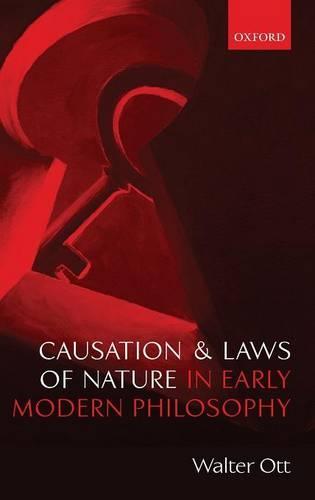Overview
Some philosophers think physical explanations stand on their own: what happens, happens because things have the properties they do. Others think that any such explanation is incomplete: what happens in the physical world must be partly due to the laws of nature. Causation and Laws of Nature in Early Modern Philosophy examines the debate between these views from Descartes to Hume. Ott argues that the competing models of causation in the period grow out of the scholastic notion of power. On this Aristotelian view, the connection between cause and effect is logically necessary. Causes are 'intrinsically directed' at what they produce. But when the Aristotelian view is faced with the challenge of mechanism, the core notion of a power splits into two distinct models, each of which persists throughout the early modern period. It is only when seen in this light that the key arguments of the period can reveal their true virtues and flaws. To make his case, Ott explores such central topics as intentionality, the varieties of necessity, and the nature of relations. Arguing for controversial readings of many of the canonical figures, the book also focuses on lesser-known writers such as Pierre-Sylvain Régis, Nicolas Malebranche, and Robert Boyle.
Full Product Details
Author: Walter Ott (Virginia Tech)
Publisher: Oxford University Press
Imprint: Oxford University Press
Dimensions:
Width: 16.20cm
, Height: 2.20cm
, Length: 24.10cm
Weight: 0.565kg
ISBN: 9780199570430
ISBN 10: 0199570434
Pages: 274
Publication Date: 03 September 2009
Audience:
Professional and scholarly
,
Professional & Vocational
Format: Hardback
Publisher's Status: Active
Availability: To order

Stock availability from the supplier is unknown. We will order it for you and ship this item to you once it is received by us.
Reviews
Walter Ott offers us a fascinating account of the development of theories of causation and laws of nature in the early modern period... a great piece of scholarship covering an impressive array of figures. It is quite a demanding read, but well worth the effort. * Eric Stencil, Journal of the History of Philosophy * I find the book truly illuminating, rich and intriguing. It is clearly an important contribution to the literature on early modern metaphysics and natural philosophy. * Yitzhak Melamed, Archiv fuer Geschichte der Philosophie * Causation and Laws of Nature combines philosophical acumen and historical care to offer a fresh perspective on early modern views of causation, intentionality, power, necessity, and laws of nature. Cutting a path from Aquinas and Suarez through Descartes and the occasionalists to Hume, Ott explores tensions and problems central to the development of early modern philosophy. There is much to learn here about the history of philosophy and some of its most important figures. * Christia Mercer, Columbia University * Walter Ott offers an especially clear narrative concerning the development of the notions of causation and causal laws during the period bounded by Descartes and Hume. This narrative usefully distinguishes bottom-up approaches that take causation to be grounded in the properties of physical objects from top-down approaches that take causal laws to provide a contribution to causation in the physical world that cannot be reduced to the contribution of such properties. A distinctive feature of Otts discussion is its use of the views of Régis and Locke to illustrate the nature of bottom-up accounts of causation in the early modern period. Various aspects of Otts interpretations both of these figures and of Descartes, Malebranche, Boyle and Hume are controversial but merit the further consideration they no doubt will receive. * Tad M. Schmaltz, Duke University *
Causation and Laws of Nature combines philosophical acumen and historical care to offer a fresh perspective on early modern views of causation, intentionality, power, necessity, and laws of nature. Cutting a path from Aquinas and Suarez through Descartes and the occasionalists to Hume, Ott explores tensions and problems central to the development of early modern philosophy. There is much to learn here about the history of philosophy and some of its most important figures. Christia Mercer, Columbia University Walter Ott offers an especially clear narrative concerning the development of the notions of causation and causal laws during the period bounded by Descartes and Hume. This narrative usefully distinguishes bottom-up approaches that take causation to be grounded in the properties of physical objects from top-down approaches that take causal laws to provide a contribution to causation in the physical world that cannot be reduced to the contribution of such properties. A distinctive feature of Otts discussion is its use of the views of Regis and Locke to illustrate the nature of bottom-up accounts of causation in the early modern period. Various aspects of Otts interpretations both of these figures and of Descartes, Malebranche, Boyle and Hume are controversial but merit the further consideration they no doubt will receive. Tad M. Schmaltz, Duke University
Author Information
Walter Ott holds a Ph.D. from the University of Virginia. He is the author of Locke's Philosophy of Language (Cambridge University Press, 2004) and is currently assistant professor of philosophy at Virginia Tech.




